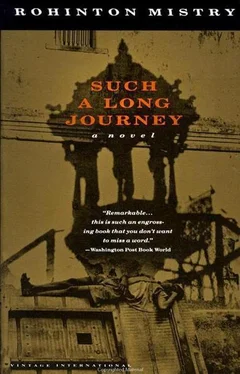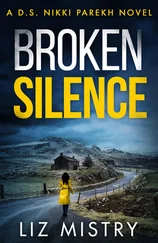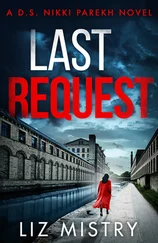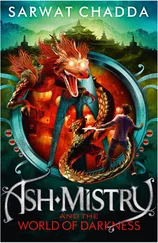How efficiently everything proceeds, thought Gustad. All routine. As though Dinshawji died every day. Alamai and Nusli took their seats. The priest picked up a sliver of sandalwood, dipped it in oil and held it to the flame. He transferred it to the thurible and sprinkled loban upon it. The fragrance of frankincense filled the room. The priest started to pray. For some reason, the quiet prayers made Nusli restless and fidgety. He kept squirming, adjusting the handkerchief on his head. But Alamai soon settled that wordlessly, by directing her elbow and knee into his person.
The dustoorji prayed beautifully. Each word emerged clear and full-toned, pure, as if shaped for the first time by human lips. And Gustad, lost in his thoughts, began to listen. It sounded so soothing. Such a wonderful voice. Like Nat King Cole’s when he sang ‘You Will Never Grow Old’. Soft, smooth, rich as velvet.
The dustoorji was not praying loudly, yet, little by little, in ever-increasing circles, his voice touched every point of the prayer room. Now and again, he added a stick of sandalwood to the thurible, or sprinkled loban. A dim bulb burned outside on the verandah. So dim, the bulb, it barely outlined the entrance, hazy behind the veil of fragrant smoke. Inside, the oil-lamp cast its soft glow on Dinshawji’s face, the flame wavering sometimes, moving with any slight breeze. And the soft glow on Dinshawji’s face moved in waves with the movement of the flame. On his face light and shadow played like little children, touching it gently, now here, and now there.
The prayers filled the dark room slowly. Slowly, the prayer sound was the dark room. And before he was aware of it, Gustad was under its gentle spell. He forgot the time, forgot Alamai, forgot Nusli. He listened to the music, the song in a language which he did not understand, but which was wondrously soothing. All his life he had uttered by rote the words of this dead language, comprehending not one of them while mouthing his prayers. But tonight, in the dustoorji ’s soft and gentle music, the words were alive; tonight he came closer than he ever had to understanding the ancient meanings.
The dustoorji cantillated the verses of the ancient Avesta. And as the notes and syllables were intoned, they mingled with the sounds of night. Steadily, from the trees and bushes rose the voices of night and nature, and from all the lush vegetation that grew here on the hill, around the Tower of Silence. The murmurings of leaf-hoppers and tree-dwellers, winged and crawling, ascended Doongerwadi, up towards the Tower of Silence. Their murmurings blended with the sandalwood and loban and prayer music floating forth from the room with the oil lamp, and Gustad understood it all.
Dilnavaz was asleep, her head thrown back on the sofa. He opened the door with his latchkey, waking her.
‘Is it very late?’ she asked.
The clock showed just after ten. The pendulum was still. He checked his watch. ‘Eleven-thirty.’ He opened the glass and felt for the key.
‘What happened?’
He wound the clock, telling her about Alamai, Nusli, the hearse, their arrival at Doongerwadi. ‘When I went to the bungalee, I was so tired and sleepy, I said to myself, I’ll leave in five minutes. Then the prayers started and…’ He stopped, feeling a little foolish. ‘So beautiful. I kept listening.’
He moved the minute hand, waited for the ten-thirty bong, then pushed it to eleven. ‘Dinshawji’s face. On the marble slab. Looked so peaceful. And you will think I am crazy…I moved my head this way and that. Changed my way of seeing. Thinking it must be the light. But…’
‘What? Tell me.’
‘There was no doubt. He was smiling.’ He checked his watch again, and adjusted the clock’s minute hand. ‘Go on. Tell me I am crazy.’
‘Prayer is a very powerful thing.’
‘I saw his face when he was still at hospital. Also in the hearse. But nothing.’
‘Prayers are powerful. Prayers can put a smile on Dinshawji’s face, or in your eyes.’
He put his arm around her. ‘I hope when I go there will be a smile like that on my face. And in your eyes.’ The clock was still silent. He pushed the pendulum gently, and shut the glass.
Those who missed the funeral notice in Jam-E-Jamshed got the news at the bank, in a memo from the manager which included employees’ names under two headings: Funeral — Monday 3.30 p.m. and Uthamna Ceremony — Tuesday 3.00 p.m. Only Gustad was given a choice before the memo was written. Mr. Madon, who had also elected to attend the funeral, offered him a ride in his car.
There was a large turnout at Doongerwadi. Few relatives, but many, many friends and colleagues. The news had taken them by surprise, so they were neither dressed in white nor had their prayer caps. But they managed somehow, the women draping their saris over the head, the men using handkerchiefs or borrowing caps from the sandalwood shop at the bottom of the hill.
It was not yet three-thirty, and people were still arriving. The overflow was accommodated in a pavilion adjacent to the bungalee, along with the non-Parsis. Looking over the gathering, Gustad realized that Dinshawji had brought laughter into the life of almost every person now sitting there silently, waiting for the last rites to commence. Even Goover-Ni-Gaan Ratansa had been known to smile occasionally at Dinshawji’s jokes.
Alamai was saving a place for Gustad in the first row facing the marble platform. Mr. Madon accompanied him to the front, to offer his condolences to Alamai. She thanked him for coming and introduced Nusli. ‘It was Dinshawji’s hope that one day, before he retired, Nusli would start working with him, side by side, at the bank. Alas, now it is too late,’ she said, doing the first spadeful of groundwork regarding her plans for Nusli.
She decided it would be politic to seat Mr. Madon also in the first row, and offered him Nusli’s chair. And Nusli, to his credit, quietly moved further down. In his white dugli and maroon prayer cap the boy-man blended with the congregation, except at the moment when the dustoorjis gave the cue for the ritual of the dog. The Doongerwadi dog was led to the bier, the char-chassam dog, who, with his preternatural eyes, would contain the nassoo, the evil of death, and assist the forces of good. Nusli craned and peered, rising excitedly from his chair like a child seeing a dog for the first time. He made soft kissing sounds and snapped his fingers lightly to get the dog’s attention.
No one noticed Nusli, however, for when the dog walked round the bier, sniffed in silence and left, Alamai suddenly stood with her arms raised and wailed: ‘O dog! Make some little sound at least! O Parvar Daegar! No barking? Now it is certain! O my Dinshaw, now you have really left me!’
Women in her vicinity hastened to calm her. Gustad and Mr. Madon were only too glad to move aside, visibly relieved at not having to comfort Alamai. Gustad shook his head at the pathetic exhibition, more pitiful for its being based on her mistaken notions about the char-chassam dog. Poor Alamai, with her modernistic ideas and her orthodox confusions.
The women held her from rushing to the bier, hanging on to her arms, trying to wrestle her down into a chair. Of course, if tall, lean Alamai had really wanted to, she could have easily tossed aside the four or five gasping women. But she suddenly gave up and flopped back. The women hugged her, patted her cheeks, adjusted her sari and said variously comforting things.
‘God’s will, Alamai, God’s will!’
Читать дальше












